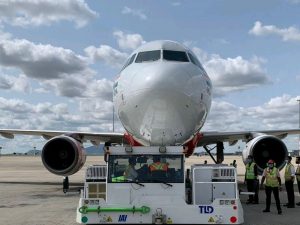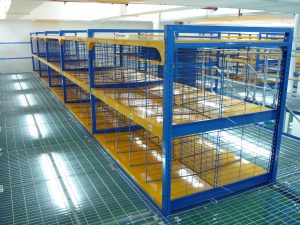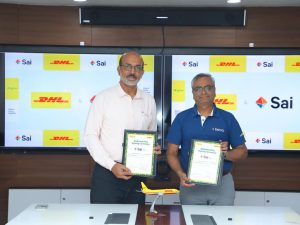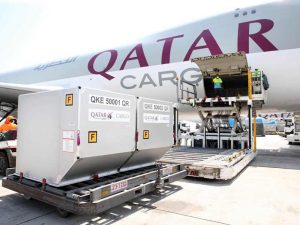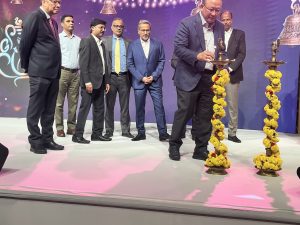Vipin Vohra, Chairman, Continental Carriers said, “With freighter operations shifting to NMIA during CSMIA’s upgrade, a smooth transition is critical. While NMIA offers modern infrastructure, it must ensure dedicated facilities for forwarders—currently concentrated around CSMIA—for efficient handling and processing. Proximity to cargo terminals is vital for seamless movement. Forwarders are preparing for the shift, but coordinated efforts and infrastructure support near NMIA are essential to minimize disruption and unlock long-term gains for Mumbai’s air cargo ecosystem.”
Read More »‘Improve road infrastructure to facilitate efficient cargo movement at NMIA’
M Afzal Malbarwala, Managing Director, Galaxy Freight shared, “We are excited about the new Air Cargo Complex (ACC) in Navi Mumbai International Airport (NMIA). It’s a big step forward for the freight forwarding industry. But we really need better infrastructure to make the most of it. The road to the NMIA needs to be improved so that cargo can get there in under an hour. This isn’t just a nice-to-have; it’s absolutely necessary. We need to clear up some questions about the cargo cleared at the old ACC. Will it be bonded and transported by airlines? If so, are there going to be extra charges for that? If they add these costs to the freight without being upfront, it could create unexpected expenses for everyone involved. Plus, if we use bonded trucking from the old ACC and only some of the cargo from an Air Waybill (AWB) gets shipped, what happens to the rest? Will it be loaded onto the plane or put on hold until the balance is ready? If the next flight doesn’t leave for a few days, who pays for the extra storage fees? Also, what’s the plan for screening the cargo? Is it going to be done at both complexes? If we pay Terminal Charges (TC) at the ACC where the cargo is cleared, will there be more charges for screening at the new ACC? Since there’s a brand-new ACC, it would be great if there were spaces for agents to create their pallets, just like in many other countries. If we can tackle these issues and get the right infrastructure in place, it will make everything run much smoother.
Read More »Navi Mumbai Int’l Airport to commence freighter ops from Aug 16, 2025
Navi Mumbai International Airport (NMIA) is nearing completion of its state-of-the-art cargo terminal and gearing up for inauguration and operation by August 16, 2025. As per an official statement, NMIA will have dedicated integrated cargo terminal (for both domestic and international) with handling capacity of 0.5 milion tonnes per annum in phase 1 and 2 and will be further scaled up to 3.25 million metric tonnes post completion of final phase. As of now, Adani Group has also announced infrastructure upgradation at Mumbai’s Chhatrapati Shivaji Maharaj International Airport. CSMIA will temporarily shut down a part of its cargo facilities and not have freighter operations from August 16, 2025, ‘until further notice’, as per the official statement. Private and charter planes operating to and from CSMIA will be moved to Navi Mumbai too. Mumbai International Airport Ltd (MIAL) has informed operators it is doing so to carry out multiple airside works including building new taxiways for Runway 14/32 to enhance its capacity and bring efficiency in operations. The Navi Mumbai Airport will be inaugurated this June and it may become operational before the Aug 16 deadline for freighter movement at CSMIA, said reports.
Read More Ȃelebi deploys Taxibots at BLR & DEL to boost sustainability
Çelebi Aviation has successfully deployed Taxibots across Bengaluru and Delhi. Taxibots are towbarless aircraft tractors that are fully automated. Unlike traditional methods, where aircraft engines are used to taxi from the gate to the runway, these TaxiBots provide an eco-friendly alternative by towing the aircraft without the need to use the aircraft’s own engines. These state-of-the-art, semi-robotic aircraft towing systems have led to a reduction of over 1,137 tons of aviation fuel (ATF) consumption, eliminating more than 3,500 tons of CO₂ emissions while saving over 427 hours of ground time for airlines and also saving 1429 hours of engine time for aircrafts, which translates into significant financial benefits and sustainable solutions for airline partners. As part of its electrification roadmap, Çelebi is the First ground handling company in India to proactively invest in Taxibot technology, and globally these were first operated on commercial operations in India. The company has currently deployed Taxibot units at Delhi’s Indira Gandhi International Airport (DIAL) and at Bengaluru’s Kempegowda International Airport (BIAL). This initiative directly aligns with global aviation’s carbon neutrality goals and India’s sustainability vision. Additionally, Çelebi Aviation has ensured operational excellence by training 3,592 certified Taxibot crew members, positioning itself as a future-ready ground handling partner. With airlines increasingly prioritizing green solutions, Çelebi’s Taxibot deployment is set to further revolutionize aircraft movement efficiency at major Indian airports.
Read More »Crown Worldwide unveils custom bonded warehousing service in India
Crown Worldwide Group has introduced its new custom bonded warehousing service in India, operated under its Crown Workspace & Warehousing division. The new service is designed to provide businesses with a duty-free, secure, compliant and technology-enabled solution for storing high-value imported goods without the immediate payment of customs duty. This strategic initiative aims to streamline import-export operations, ensure superior logistics services and provide global businesses greater agility in managing their supply chains. The bonded warehouse is now operational in Mumbai. It offers ISO-certified, digitally managed, and tamper-proof, dust-free storage designed to handle a wide range of high-value products—including fine wines and spirits, luxury goods and fashion, jewelry, electronics, and general cargo. The facility also supports ESD-safe handling for sensitive electronic items and includes flexible options for bulk and industrial goods. In terms of security, the warehouse is equipped with 24/7 surveillance, restricted access protocols, and full insurance coverage against theft or damage. It is built to meet international standards for safety and operational efficiency, ensuring clients have complete peace of mind. Kavitha Suresh, Assistant General Manager, Workspace and Warehousing- Crown Worldwide Group spoke about this latest venture, “At Crown, we have always looked to push boundaries. The custom-bonded warehousing service integrates technology to provide our clients with a seamless storage and transit experience. Through this new development, we are effectively bridging global benchmarks with local needs. From luxury items to bulk to electrical, electronics, and imported wine & spirits we look forward to catering to all sectors and offering a great experience to our clients.”
Read More »‘Lead framework being implemented to foster data driven logistics’
Rajat Kumar Saini, CEO and MD, NICDC and Chairman NLDS in an exclusive interview shared, “The Viksit Bharat 2047 vision, driven by innovative government initiatives aimed at enhancing infrastructure, connectivity, and overall supply chain efficiency. Logistics is a key enabler of economic growth, and efforts such as the National Logistics Policy and PM Gati Shakti are instrumental in reducing logistics costs and improving India’s global competitiveness through multimodal integration and streamlined operations. To support this vision, we are implementing the LEAD framework — focusing on Longevity, Efficiency & Effectiveness, Accessibility & Accountability, and Digitalisation — to foster a modern, data-driven logistics ecosystem. In this context, NLDSL has taken a pioneering role in the digital transformation of the logistics sector. Our flagship initiative, the Logistics Data Bank (LDB), launched in 2015, has successfully tracked over 80+ million EXIMcontainers across their journey within India, bringing unprecedented transparency and visibility into container movement. Building on this foundation, we introduced the Unified Logistics Interface Platform (ULIP) in September 2022, under the PM Gati Shakti initiative. ULIP integrates data from 43 systems of 11 ministries, enabling seamless, digital, and paperless logistics operations. This platform addresses a wide range of industry use-cases, significantly reducing time and costs for stakeholders across the supply chain. Together, LDB and ULIP are not just technological advancements; they are strategic enablers in India’s journey toward becoming a global logistics hub. By enhancing operational efficiency and sustainability, these initiatives are poised to accelerate economic growth, generate employment, and elevate India’s position in the global economy — all contributing directly to the realization of Viksit Bharat @ 2047. These efforts lay the foundation for a world-class, future-ready logistics infrastructure and a digitally empowered …
Read More »DHL, Sai Life Sciences join forces to boost sustainable Pharma deliveries
DHL Express has partnered with Sai Life Sciences to use DHL’s emission-reduced shipping solution – GoGreen Plus (GGP). The partnership provides Sai Life Sciences with a greenhouse gas emissions reduction of up to 90% for its international logistics needs by using SAF. Sai Life Sciences works with over 300 global innovator pharma and biotech companies to accelerate the pace of their drug discovery, development and commercialisation. R.S Subramanian, Senior Vice President – South Asia, DHL Express, said, “Addressing Scope 3 emissions is critical to DHL for achieving the commitment to be carbon neutral by 2050. GoGreen Plus is a pioneering service that helps our customers address Scope 3 carbon emissions of their critical shipments to global destinations. The Life sciences and healthcare sector is a focus area for growth outlined in our Strategy 2030 and GoGreen Plus is very relevant to key players here who have a committed road map on carbon footprint reduction. We are incredibly proud to have Sai Life Sciences join us on our mission to reduce Scope 3 emissions with GoGreen Plus – the most technically viable option currently available.”
Read More »Qatar Cargo, MASkargo, IAG unite to launch global biz
Monasa.AI boosts freight sales with digital bookings
Monada.AI is all set to accelerate freight sales with integrated CargoAi’sCargoCONNECT Quote & Book API Integration for faster air quoting & booking. With this collaboration, both Monada.ai and CargoAi are reinforcing their commitment to building the future of logistics—where intelligent automation, visibility, and data-driven decision-making define success. “At Monada.ai, we are redefining how freight forwarders sell—turning scattered data and manual processes into clear, actionable workflows. Integrating CargoAi’s Quote & Book API allows us to deliver a powerful, AI-enhanced user experience that makes air cargo booking seamless and smart,” said Shahar, CEO of Monada.ai. “This partnership with Monada.ai exemplifies our mission to digitize every layer of airfreight procurement. Through our CargoCONNECT APIs, we’re unlocking new possibilities for logistics players to optimize operations and scale efficiently,” said Matt Petot, CEO of CargoAi.
Read More »AISATS launches multimodal logistics park at BLR Airport
Air India SATS Airport Services (AISATS), launched AISATS BLR Logistics Park at Kempegowda International Airport, Bengaluru (BLR Airport). One of the largest on-airport logistics parks in South India, constructed with an investment of Rs. 200 crores, the facility was inaugurated, marking a significant milestone in strengthening India’s logistics and cargo infrastructure. The launch of the AISATS BLR Logistics Park is a step towards enhancing cargo handling capabilities, improving operational efficiencies, and catering to the rising demand for faster, seamless, and more sustainable cargo supply chain. Strategically located within the airport premises, the facility will play a key role in supporting exporters, importers, freight forwarders, and logistics providers, ensuring efficient cargo movement and consolidation services. Spread across 8 acres within Bengaluru’s fast-growing airport, the AISATS BLR Logistics Park is set to become a key enabler of regional trade. The Logistics Park is a cluster of three distinct buildings to serve the cargo community. A modern two-level main warehouse offering more than 240,000 sq. ft of Grade A warehousing space, designed to serve the freight forwarders, express courier operators and leading logistics players. Importantly, this main warehouse includes a common-user general warehouse space to cater for small and medium enterprises and cold storage warehouse space for pay-per-use access, strengthening inclusivity and competitiveness in the logistics ecosystem. To complement this, there is a 11,000 sq. ft public bonded warehouse to allow importers and OEMs to securely store and manage their cargo shipments under Customs bond. The Logistics Park also offers an office block with 24,000 sq. ft of space for Customs House Agents, logistics companies and support services. AISATS will also provide trucking services to ensure faster, economical and seamless movement of cargo …
Read More » Cargo Breaking News
Cargo Breaking News



